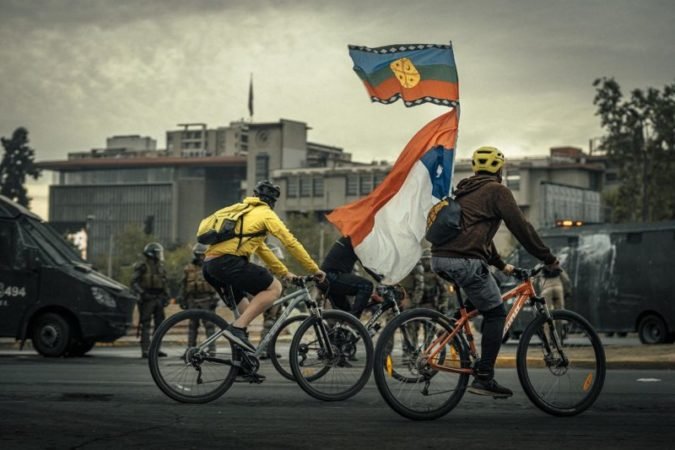Peaceful Bicycle Protesters Push for a New Chilean Constitution

The recent increment of 30 pesos in the metro fare in Santiago, Chile unleashed protests which reveal 30 years of inequality throughout the nation. Spite the plans of decarbonisation, Chile continued pushing for carbon projects, and with the suspension of the COP25 and APEC summits, the model of socio-environmental injustices now seeks a new national constitution. With recent warnings from the UN that the only way to avoid an ecological breakdown is by reducing the world’s emissions on an annual 7.6 percent since 2020, puts the spotlight on Santiago, which is currently under an environmental emergency due to air pollution. The discontent on the youths which has not taken the streets is expressed in many ways, one of the most interesting ones is not only peaceful but also sustainable: massive tours of bicycles around the city.
Nicolás Riquelme is member of the collective Plurinational Cycling Revolution, a spontaneous reaction of the Santiago cycling community to the Chilean social outburst. After years of promoting the use of bicycles as the alternative for sustainable mobility in Santiago, they launched their “Cycling Revolution” manifesto last 27th of October, where groups from all the regions of Chile joined. Since then they have mobilized over 35,000 people every Sunday, cycling for social dignity and a healthy environment.
“We want cities in Chile to fit to their inhabitants’ expectations and to a human scale. Taking the highway and turning it into a bike lane demonstrates that we have been segregated by the years of profit by the companies. By skipping the tolls with our bikes, rollers or skates we are trying to show that it is possible to move freely and without polluting the city. Let’s give back the city to its people and recover the spreading spaces which were taken away from us”.
In order to provide mapping information for those who venture to ride across Santiago and other cities like Maipú, these collective has come up with Bikelite, an app which helps bikers to find the best pathways to find their way from the peripheries to the streets of downtown. Due to the pollution caused by motorized vehicles, industries and homes using firewood for heating and cooking, bicycle riders in Santiago are forced to wear masks to protect themselves from the smog.

The Plurinational Cycling Revolution so far has mobilised the social claims to the wealthiest areas of Santiago and even to the doorsteps of the President’s residence, not only this, but it also sought for justice for Gustavo Gatica, a young man who lost his eyesight as a result of police violence. Their long tours also include popular areas such as Pudahuel, La Legua and Lo Hermida, which challenges the lack of coverage given to them by local and conservative media. Dhan Zunino is a sociologist from Argentina’s CONICET and expert in urban mobility who thinks that pedalling a bicycle is a political act, hence, all mobility is political and we must not look at transport as a separated sector from the economy or urban planning.
“One can make sustainable policies without improving the social quality of people, in the sense of what is happening in Chile: they tried to improve the transport system, but structurally, the social inequality persists. We could say that the passengers are travelling better, and sometimes there might even be certain practical improvements, but they do not change the place that a poor worker occupies within the society, although he now commutes with air conditioning” comments Zunino.
A compliment to this argument is the proposal by the feminist movement 8M (8 of March 2019), the largest post-dictatorial protest which took place until the revolt initiated in October. Alondra Carrilo, the spokeswoman from the collective, explains:
“Our horizon is one of fights and future would enable us to fight the chauvinistic violence that limit our people from making a transformation with relations that are productive between us the women, the different people that inhabit Chile and the natural environment which surrounds us. This means a transversalisation of the feminist movement within the current environmental debate”

Alejandro Pelfini is a professor of Global Studies at FLACSO and the Alberto Hurtado University in Chile. Asked about these recent events, he believes that firstly it must be understood that Chile does not pursue a post-development strategy in its environmental or energetic agenda or even to what it refers to its insertion in the global economy. In any case, it’s a proposal closer to the Green Economy, or most likely, an attempt to promote a strategy for “greening the economy” which certainly has had certain relevant advances: mostly on the renewable energies field during the Bachelet administration, which led to a major discussion on climate change. Then he sees continuity with Piñera but framed in a more cosmetic way to gain regional leadership on those fields.
“Although Chile may not be hosting the COP, they still hold the Presidency until the end of the summit, and they are now face the surprising challenges posed by the social demands, which since the 18 of October force them to rearrange the pieces on the board. Many of these claims question the extreme privatisation and mercantilization of social life in general, putting the focus on the exploitation of natural resources and the creation of sacrifice zones which had barely received any attention from the state powers so far”.
Pelfini underlines that, without doubt, a new constitution will argue the big issues surrounding water, which is completely privatized in Chile, the royalty shortage and enormous advantages received by private investors (national and foreign) in the exploitation of natural resources in the country has a high environmental impact (forestry and salmon farming) or non-renewables (mining).


















